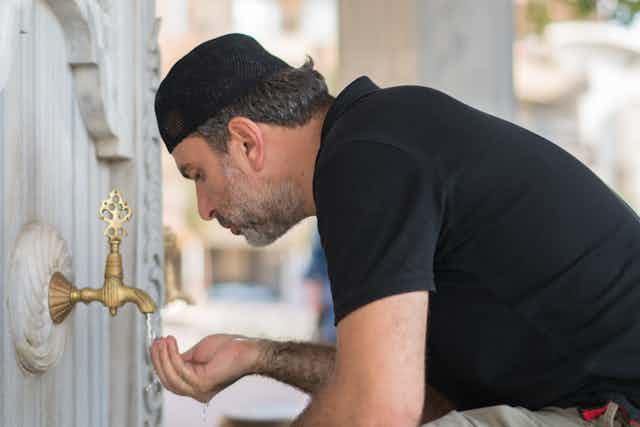As outbreaks of the coronavirus spread throughout the world, people are reminded over and again to limit physical contact, wash hands and avoid touching their face. The recent Netflix docuseries “Pandemic: How to Prevent an Outbreak” illustrates how the Islamic ritual washing, known as “wudu,” may help spread a good hygiene message.
The series focuses on Syra Madad, a Muslim public health specialist in a New York hospital, who takes a break to say her prayers at the Islamic Center of New York University. Before entering the prayer room, Madad stops to perform wudu, and washes her mouth and face as well as her feet.
Islamic law requires Muslims to ritually purify their body before praying. As a scholar of Islamic studies who researches ritual practices among Muslims, I have found that these practices contain both spiritual and physical benefits.
Ritual purity
The Prophet Muhammad left detailed guidance for Muslims on how to live their lives, including how to pray, fast and stay ritually pure. This guidance is available in collections called the Hadith.
According to Islamic law, there are minor and major impurities. Minor impurities involve urinating, defecating and sleeping, among other practices. A person of Muslim faith is supposed to perform a ritual washing of their bodies before praying to get rid of these minor impurities.
Wudu is to be performed, as was done by the Prophet Muhammad, in a specific order before praying, which takes place five times a day. Before each prayer, Muslims are expected to wash themselves in a certain order – first hands, then mouth, nose, face, hair and ears, and finally their ankles and feet.
While washing with water is required when it is available, if a person has limited access to water, then a Muslim is permitted to symbolically “cleanse” their hands and face with dust or sometimes sand or other natural materials.
A Quranic verse says: “And if you are ill or on a journey or one of you comes from the place of relieving himself or you have contacted women and find no water, then seek clean earth and wipe over your faces and your hands [with it]. Indeed, God is ever Pardoning and Forgiving.”
A hadith from the prophet also describes the Earth as a purifying agent if there is a scarcity of water for washing.
Major impurity is defined in Islamic texts as occurring after sexual activity or when a woman completes her menstrual cycle. A Muslim woman should not pray during her menstrual cycle. To purify oneself after such an impurity, a Muslim is required to take a shower, called “ghusl.” A person needs to wash their entire body, from head to toe, including their hair.
Spiritual actions
Preparing for prayer by washing one’s body using water can be a deeply spiritual act for Muslims. Islamic studies scholar Paul Powers argues it isn’t “empty ritualism,” but an embodied practice that helps the individual center on an inner religiosity.
Similarly, another Islamic studies scholar, Marion Katz, explains in her 2002 book “Body of Text” that the importance of wudu lies in its symbolic cleansing. It does not always cleanse the parts of the body that are “physically involved in the pollution act.”
Ritual purity is different from hygienic practices, although Islam also emphasizes good hygiene. Muslims take care to wash often, including using water after going to the bathroom.
Aligning with public health guidelines
In view of the coronavirus risk, Muslim leaders around the world, including in the U.S., have aligned their religious opinions with public health experts.
Muslim institutions have begun to recommend that people make sure to wash their hands for 20 seconds with soap before doing wudu. Emphasizing that wudu alone cannot prevent the virus from spreading, other Islamic institutions recommend that mosques supply extra soap and hand sanitizer near the washing area.
They have issued rulings to cancel Friday prayers, urged Muslims to wash their hands with soap regularly, refrain from touching their face and practice social distancing.
While people have cleared local store shelves of hand sanitizers, wipes, cleaning supplies, gloves and masks, basic hygiene practices remain the best way to prevent the spread of the coronavirus and other viruses.
At this time, Islamic practices that emphasize purity of body could help reiterate the importance of hygienic practices along with the use of soap or hand sanitizer, to reduce one’s vulnerability to the virus.
[You’re smart and curious about the world. So are The Conversation’s authors and editors. You can read us daily by subscribing to our newsletter.]

